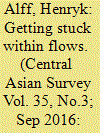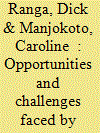|
|
|
Sort Order |
|
|
|
Items / Page
|
|
|
|
|
|
|
| Srl | Item |
| 1 |
ID:
143383


|
|
|
|
|
| Summary/Abstract |
There is an incompatibility between measures of trade in goods and services. The measures of goods trade reflecting GATT are restricted to trade that crosses borders. Service trade, however, under GATS includes both cross-border delivery and foreign affiliate sales within borders. We propose that for comparability the trade component of foreign affiliate sales in goods should be included in goods trade or affiliate sales should be removed from the service trade data. We make modifications to reported goods and services trade for specific countries by using data on affiliate sales to produce more consistently measured cross country estimates of trade flows.
|
|
|
|
|
|
|
|
|
|
|
|
|
|
|
|
| 2 |
ID:
147194


|
|
|
|
|
| Summary/Abstract |
For more than two decades, the Sino–Soviet border was almost hermetically closed to the exchange of people and goods. In the late 1980s, however, exchanges resumed at a remarkable pace between the immediate border communities of Zharkent, in Kazakhstan, and Chinese Khorgos. But this situation was short-lived. Currently, trade turnover in consumer goods between the two countries is conducted primarily via the hub bazaars of Urumqi, in China, and Almaty, in Kazakhstan, several hundred kilometres inland from the border. While the borderland population’s agency in these trade processes remains limited, top-down modernization efforts to upgrade infrastructure in the borderlands and to ‘centralize the periphery’ are the subject of popular controversy. The article explores local representations of development and exchange in the Kazakhstan–China borderland town of Zharkent and the everyday social practice and discourses they generate. I examine the peripheralization of this borderland community, which remains largely bypassed by commodity flows, at a moment characterized by multi-scalar attempts at modernization. In so doing, I argue that the trajectories of borderland lives perpetuate a subjective positioning in social space that reinforces perceptions of ‘remoteness’ and ‘disconnection’, despite powerful state-advocated visions of modernity.
|
|
|
|
|
|
|
|
|
|
|
|
|
|
|
|
| 3 |
ID:
145960


|
|
|
|
|
| Summary/Abstract |
What are the reasons for the extraordinary dynamism of many African border regions? Are there specificities to African borderlands? The article provides answers to these questions by analysing the historical development of African state borders’ social and economic relevance. It presents a typology of cross-border trade in Africa, differentiating trade across the ‘green’ border of bush paths and villages, the ‘grey’ border of roads, railways and border towns, and the ‘blue’ border of transport corridors to oceans and airports. The three groups of actors associated with these types of trade have competing visions of the ideal border regime, to which many dynamics in African cross-border politics can be traced back. The article contributes to African studies by analysing diverging political and economic developments in African countries through the lens of the border, and to border theory by distilling general features of borders and borderlands from African case studies.
|
|
|
|
|
|
|
|
|
|
|
|
|
|
|
|
| 4 |
ID:
152039


|
|
|
|
|
| Summary/Abstract |
This paper assessed the opportunities and challenges faced by women involved in informal cross-border trade (ICBT) in Mutare during a prolonged economic crisis in Zimbabwe. Sixteen women informal cross-border traders were interviewed in depth while two cross-border bus drivers and two customs officials provided key information, which was categorized and discussed along emerging themes. The women were mainly middle-aged single parents who engaged in ICBT for survival. On average, they were educated but forced into ICBT by economic hardships and lack of jobs associated with the closure of industries that started in the late 1990s. Deindustrialization, however, created opportunity for the women to obtain Zimbabwean passports and import clothes, blankets, electrical gadgets and vehicle spare parts from South Africa (SA). Hence, a delay in obtaining the passport which costs US$51 and issued within six months was the women’s first challenge. Desperate to save meager incomes as most Zimbabweans resorted to ICBT, most of them slept in the open while in SA. Local authorities harassed them searching and confiscating undeclared goods. The women’s children suffered as they missed their mothers’ attention, control and love. Instead of helping the women’s businesses flourish, government proposed banning imports to revive Zimbabwe’s industrial sector.
|
|
|
|
|
|
|
|
|
|
|
|
|
|
|
|
| 5 |
ID:
175898


|
|
|
|
|
| Summary/Abstract |
We present a power market model that couples short-term electricity markets of five interconnected countries: Switzerland, Austria, Germany, Italy and France. The model simulates the Swiss energy transition. It examines the impact of international (carbon taxation, fuel prices and the expansion of cross-border transmission capacities) and national policies both on short-term operation and long-term evolution of Swiss electricity supply, CO2 emissions, consumer costs and security of supply. The study shows the importance of understanding the interplay of policies and market players to achieve the decarbonization goals effectively. We simulate three national scenarios (Reference, RES+, NUC+), which differ in RES support and nuclear phase-out plans. We compare them along the dimensions of the Energy Trilemma prism: sustainability (CO2 emissions), affordability (costs to the consumer) and security of supply. The Reference scenario results in the highest CO2 emissions. Boosting solar via increased RES support in the RES + scenario reduces CO2 emissions, but increases costs to consumers. NUC + scenario provides the highest CO2 savings potential and the lowest costs to consumers. However, the nuclear extension would need to obtain regulatory or social approval. All scenarios prove a need for a Strategic Reserve to ensure compliance with the legal security of supply criteria.
|
|
|
|
|
|
|
|
|
|
|
|
|
|
|
|
| 6 |
ID:
132754


|
|
|
|
|
| Publication |
2014.
|
| Summary/Abstract |
We study two electricity markets connected by a fixed amount of cross-border capacity. The total amount of capacity is known to all electricity traders and allocated via an auction. The capacity allocated to each bidder in the auction remains private information. We assume that traders are faced with a demand function reflecting the relationship between electricity transmitted between the markets and the spot price difference. Therefore, traders act like Bayesian-Cournot oligopolists in exercising their transmission rights when presented with incomplete information about the competitors' capacities. Our analysis breaks down the welfare effect into three different components: Cournot behavior, capacity constraints, and incomplete information. We find that social welfare increases with the level of information with which traders are endowed.
|
|
|
|
|
|
|
|
|
|
|
|
|
|
|
|
|
|
|
|
|